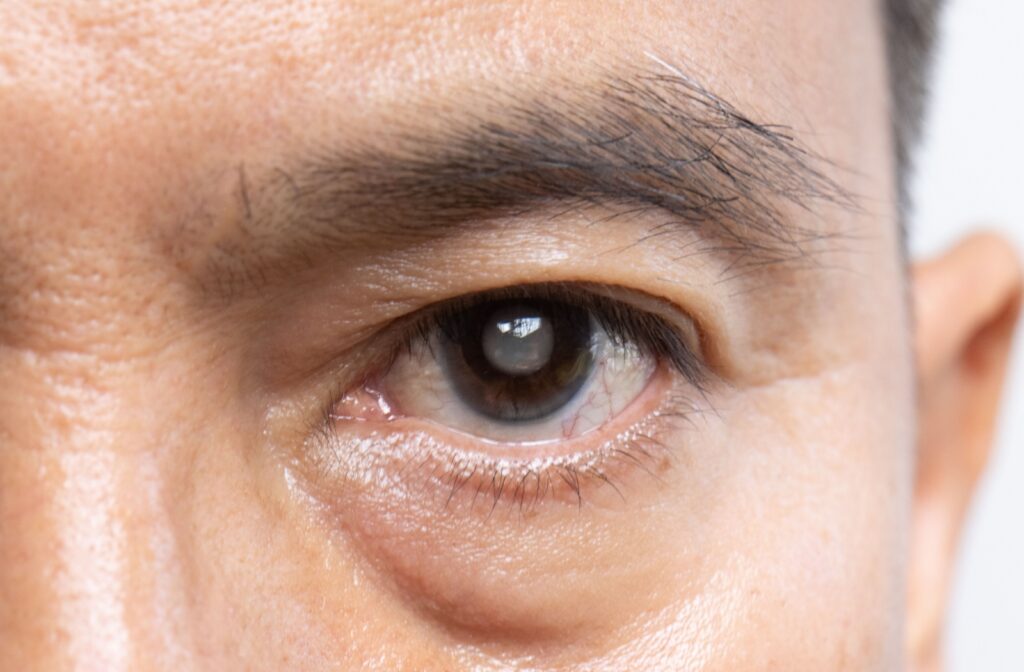Have you noticed your vision becoming cloudy, like looking through a thin veil or fog? Often described as a “film over the eye,” this sensation can be frustrating and concerning.
Whether it’s fleeting or persistent, understanding what causes this phenomenon is the first step toward finding relief and maintaining healthy vision.
Let’s explore the common causes of a film over the eye, from everyday conditions like dry eye syndrome to more complex issues like cataracts or infections. Learn how to manage this uncomfortable symptom and when it’s time to seek professional care.
Common Causes of a Film Over the Eye
The sensation of a “film over the eye” can be frustrating and has many potential causes. If you’re frequently experiencing this symptom, or if it’s a constant concern, the first step to clear vision is pinpointing the cause. Let’s look at some common reasons and their visual impact.
Dry Eye Syndrome
One of the leading causes of a filmy sensation is dry eye syndrome, which occurs when your eyes don’t produce enough tears or the right type of tears to keep them lubricated. The condition can leave your eyes feeling irritated, gritty, or blurry, and even cause temporary vision changes.
Why Does Dry Eye Happen?
Common causes of dry eye include:
- Age-related tear production changes
- Prolonged screen time without proper breaks
- Environmental factors like wind or dry air
- Certain medications
How to Manage Dry Eye
Adding moisture to your eyes is key. Artificial tears, lifestyle changes (like taking regular breaks from screens), and other treatments recommended by your eye doctor can all help restore comfort and clarity.
Dry eye is a chronic problem that can have long-lasting effects on your eye health. It’s crucial to promptly address concerns of dryness, watery eyes, redness, or stinging sensations to avoid worsening irritation.
Cataracts
Cataracts, a common age-related condition, often cause blurred or cloudy vision. Over time, the lenses in your eyes can become cloudy, leading to the sensation of a film over your eyes.
Key Cataract Symptoms
Cataracts typically progress gradually, making early symptoms easy to miss. But watch for changes, as identifying this condition early offers more treatment possibilities. Signs can include:
- Sensitivity to glare
- Difficulty seeing in low light
- Hazy or dimmed vision
How to Manage Cataracts
Cataracts are a common part of aging, and fortunately, they’re highly manageable. Regular eye exams are crucial for early detection and treatment. You can improve clarity with prescription glasses or contact lenses during the early stages.
When the condition progresses, cataract surgery can replace the clouded lens with a clear artificial lens, significantly improving your vision.
Allergies & Irritation
Your eyes might also react to allergens like pollen, dust, or pet dander, causing irritation and a film-like feeling.
Signs That Indicate Allergies & Irritation
Your eyes are sensitive, and you may experience a number of sensations and symptoms when your eyes are irritated, from swelling to blurred vision. Any time your vision changes suddenly, seeing your eye doctor is crucial.
However, if your irritation points to allergies, you might also notice:
- Itchy, red, or watery eyes
- Puffy eyelids
- Burning sensation
How to Manage Eye Allergies
Antihistamine eye drops, minimizing your exposure to allergens, and consulting your doctor for tailored advice can help provide relief.
Contact Lens Discomfort
If you wear contact lenses, you may experience a film over your eyes after long periods of wear. Improper care, dirty lenses, or extended use can contribute to this discomfort.
What You Should Do
To reduce discomfort, try these contact lens care tips:
- Following proper cleaning & storage routines
- Removing contacts before sleeping
- Taking breaks to allow your eyes to breathe
When discomfort persists, consult your eye doctor. They may recommend switching to a different lens type or provide tips to improve your experience.
Conjunctivitis (Pink Eye)
Conjunctivitis, or pink eye, is a common cause of eye inflammation. Not all forms are contagious, as there are 3 types: infectious (viral or bacterial), allergic, and chemical.
Symptoms to Watch For
While symptoms vary by type, most pink eye cases involve redness, irritation, and sometimes a sticky discharge that creates a film-like sensation over the eye. Symptoms to watch for include:
- Pink or red eyes
- Discharge that can crust over the eye
- Swelling, itching, or irritation
- Sensitivity to light
- Watery eyes
How to Manage Pink Eye
Although allergic pink eye can disappear when you avoid allergens, its viral and bacterial counterparts are very contagious and can become long-lasting if left unmanaged.
That’s why swift medical attention is crucial to identify the cause and begin the right treatment, such as prescription eye drops or creams.

Corneal Conditions
The cornea’s smooth surface is essential for clear vision. Any disruptions, such as abrasions or corneal dystrophies, can create a film-like effect.
Causes to Consider
Everything from simple dehydration to complex issues like injuries, infections, or chronic conditions can affect your cornea’s health. That’s why visiting your eye doctor is crucial to identify the root cause of symptoms like blurriness or a film over your eye. These could stem from:
- Minor scratches (corneal abrasions)
- Chronic conditions impacting the cornea’s structure
How to Manage Corneal Conditions
Consulting an eye care professional for early diagnosis and treatment is crucial. Many corneal conditions are manageable if caught early.
Medication Side Effects
Certain medications, such as those for high blood pressure or allergies, can interfere with tear production or impact eye health, producing a filmy sensation. Examples include antihistamines, beta-blockers, or antidepressants.
Next Steps
Discuss any new symptoms with your doctor. Adjusting the medication or using supplemental eye treatments can often resolve the issue.
When to Consult an Eye Doctor
While many causes of a film over the eye are minor and manageable, some issues may require immediate attention. Consider seeing an eye care professional if you experience:
- Persistent or worsening haziness
- Pain in your eyes
- Sudden changes in vision
- Flashes of light or floaters
Early diagnosis can support effective treatment and prevent complications.
Clear Vision Starts with Proactive Care
A filmy sensation over your eyes is more than just an annoyance. It’s your body’s way of signalling an underlying issue that needs attention.
Whether it’s managing dry eye with artificial tears, addressing cataracts, or treating allergies, there are solutions to help restore clarity and comfort to your vision.
At Warman Eyecare, we’re committed to protecting your eye health. Schedule your next eye exam with us to discover how we can support your vision for years. Clearer days are just an appointment away!









